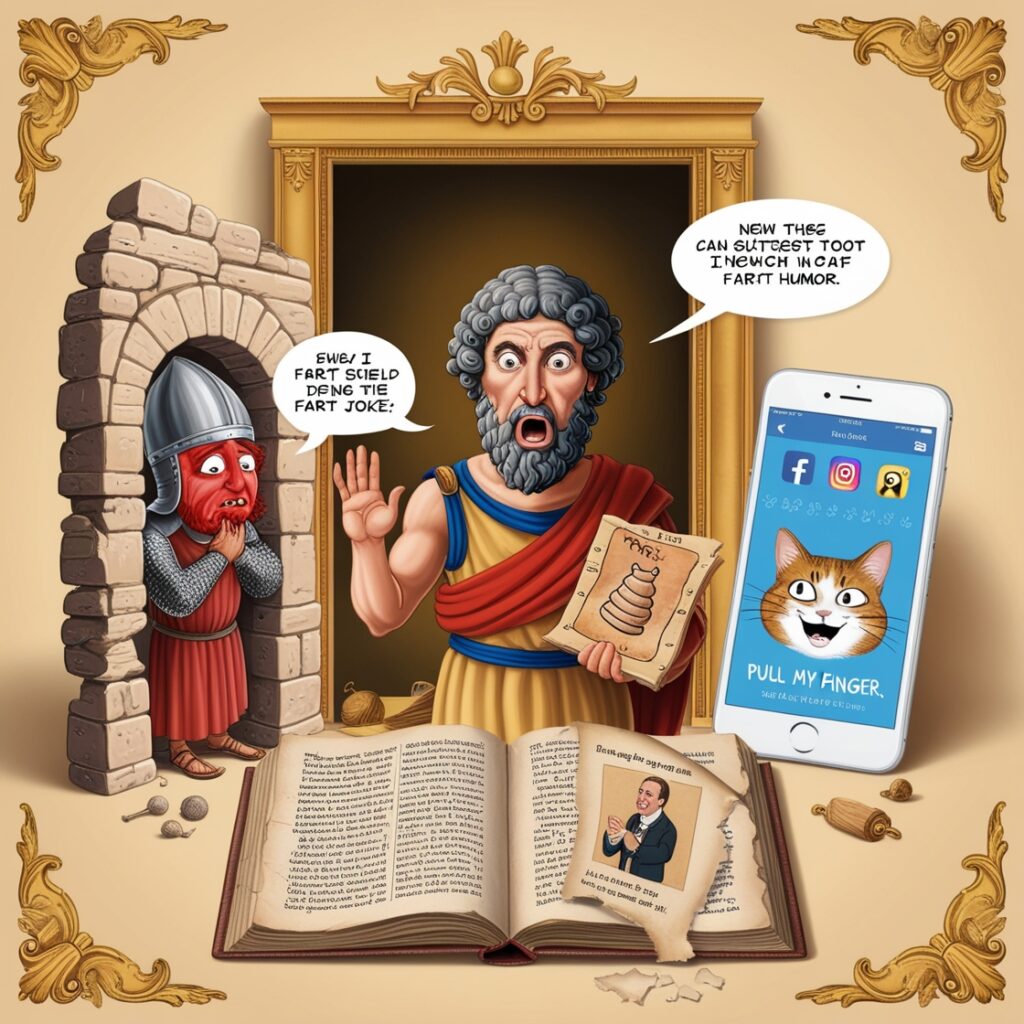Fart jokes have been making people laugh for centuries, transcending cultures, time periods, and social classes. But have you ever wondered where fart humor comes from, or how long humans have been laughing at the sound of a well-timed toot? Believe it or not, fart humor has a rich history that stretches back to ancient civilizations and has evolved into the memes and jokes we see today.
In this post, we’ll take a fun journey through the history of fart humor, exploring how farts became a staple of comedy from ancient times to the internet age. Whether you’re a fart joke enthusiast or just curious about the origins of this timeless humor, you’re in for a hilarious (and educational) ride!
Fart Jokes in Ancient Civilizations
Fart humor is far from a modern invention. In fact, some of the earliest recorded jokes involve flatulence! Here’s a look at how ancient civilizations embraced the comedic potential of a good fart:
1. The World’s Oldest Joke (Sumer, 1900 BC)
One of the world’s oldest known jokes, recorded on a Sumerian tablet from around 1900 BC, is—unsurprisingly—a fart joke. The joke goes:
“Something which has never occurred since time immemorial; a young woman did not fart in her husband's lap.”
Even in ancient Mesopotamia, people found humor in the absurdity of bodily functions, proving that fart jokes have been making people laugh for nearly 4,000 years.
2. Farting in Ancient Greece
The Greeks weren’t shy about using fart humor in their comedies. The playwright Aristophanes, one of the most famous writers of ancient Greek comedy, often included fart jokes and other forms of crude humor in his plays. In his work “The Clouds,” one character boasts about his ability to produce loud, impressive farts—a clear sign that flatulence was seen as a source of amusement even in highbrow Greek society.
3. Fart Humor in Ancient Rome
The Romans also enjoyed a good fart joke. Petronius, a Roman satirist, included plenty of crude humor in his famous work “Satyricon.” The text often portrays farting as a natural and humorous part of daily life, especially during feasts and banquets.
In fact, Roman Emperor Elagabalus was known for enjoying bizarre practical jokes, which included hosting fart-heavy meals to amuse his guests.
Medieval Fart Humor: Enter the Court Jester
As we move into the Middle Ages, fart humor remained popular, especially among the lower classes. Farts were often used in folk tales and oral storytelling, and performers such as jesters and minstrels frequently incorporated fart jokes into their routines.
1. Roland the Farter: The Professional Flatulist
One of the most famous figures in medieval fart humor was Roland the Farter, a jester who served King Henry II of England in the 12th century. Roland’s claim to fame was his ability to perform a “leap, a whistle, and a fart” as part of his annual Christmas performance for the king. In exchange for his unique talents, Roland was awarded an estate in Suffolk!
2. Chaucer and Shakespeare: Fart Jokes in Literature
The renowned English writer Geoffrey Chaucer included fart humor in his classic work “The Canterbury Tales” (late 14th century). In “The Miller’s Tale,” a character named Nicholas plays a prank on an unsuspecting victim by sticking his rear out of a window and farting in his face—a prime example of how fart jokes were incorporated into literature.
William Shakespeare, too, wasn’t above using fart jokes in his plays. In “The Comedy of Errors,” Shakespeare includes a humorous exchange where a character tries to blame a bad smell on a nearby “rotten apple” rather than admit to farting.
Farting in the Modern Era: From Comedy Skits to Cartoons
As society moved into the modern era, fart jokes continued to evolve and find their way into popular entertainment. With the rise of theater, radio, and television, fart humor became more widespread than ever.
1. Fart Jokes in Vaudeville and Early Comedy
During the late 19th and early 20th centuries, vaudeville performers embraced slapstick comedy, which often included fart jokes and other physical gags. Acts featuring sound effects, including fart noises, were a crowd favorite. Farts were seen as a lowbrow form of humor that could unite audiences in laughter.
The advent of silent film comedy—made famous by stars like Charlie Chaplin and Buster Keaton—often used fart-related physical comedy (like the use of exaggerated expressions when a fart is heard off-screen). While sound hadn’t yet made its way into films, visual cues for farts still got big laughs.
2. Farting in Cartoons and Television
As television and animated cartoons gained popularity in the mid-20th century, fart jokes became a staple of shows aimed at both children and adults. Classic cartoon characters like Bugs Bunny and Daffy Duck would often use fart noises in their antics, setting the stage for modern animated fart humor.
In the late 20th century, animated TV shows like “South Park” and “Family Guy” fully embraced fart humor. “South Park,” in particular, turned fart jokes into an art form, with characters like Eric Cartman delivering some of the most iconic fart-related moments in TV history.
Fart Jokes in the Digital Age: Memes and Social Media
With the rise of the internet, fart humor has found a new home on social media platforms, meme pages, and viral videos. Memes allow fart jokes to spread faster and reach a wider audience than ever before, with new variations and themes emerging every day.
1. Fart Memes
Fart memes have become a go-to form of internet humor, with millions of memes dedicated to capturing the humor of everyday fart situations. Whether it’s an image of a person trying to hide a fart in public or a pet letting one rip at the wrong moment, fart memes continue to be a hit across social media platforms like Instagram, Reddit, and Twitter.
2. Viral Fart Videos
One of the most popular types of fart content on the internet is the viral fart video. From prank videos where people fart in elevators to unexpected fart sound effects in serious moments, these clips regularly rack up millions of views. Platforms like TikTok have become a haven for fart humor, with users creating short, funny videos that showcase farting in all its glory.
The Timeless Appeal of Fart Humor
So, why have farts remained such a popular source of humor for so long? The answer is simple: farting is universal. No matter your age, gender, or background, everyone farts—and it’s a natural part of being human. The fact that something so simple can cause such an uproar of laughter is a testament to the enduring power of fart humor.
Farts break down social barriers, allowing people to laugh together at something they all experience. Whether it’s an ancient Greek play or a modern-day meme, fart humor reminds us that sometimes the funniest things in life are the ones that are the most relatable.
Conclusion:
Fart humor has been around for thousands of years, from ancient Sumerian jokes to viral internet memes. Throughout history, people have embraced the comedy of farts, finding humor in a simple bodily function that transcends cultures and time periods. Whether you’re reading classic literature, watching cartoons, or scrolling through social media, fart jokes remain a timeless form of entertainment.
Check out FartRanker’s Fart Generator to craft your own fart jokes and become a part of the long-standing tradition of fart humor. From ancient to modern times, there’s always a place for a good fart joke!



What an intriguing dive into the long legacy of fart humor! It’s fascinating to see how something as universal and natural as flatulence has woven its way through culture, from ancient Rome where folks would burst into laughter over the sound of a toot, to the modern-day barrage of memes that make us all chuckle—often because it’s just so relatable!
Even the ancient Greeks had it figured out: they recognized that laughter connected people, whether through a well-timed release of gas or clever wordplay. It’s almost poetic when you think about it: humor is like the body’s way of “letting off steam,” transforming what could be a potentially embarrassing moment into an opportunity for unity and laughter. After all, nothing brings people together quite like a shared chuckle over the natural workings of the human body.
And let’s not forget that even our digestive health contributes to this illustrious tradition! It’s a reminder that we’re all human, with biological quirks that can lead to some of the best punchlines. They say you are what you eat—so I’ve started telling people I’m just a “baked beans enthusiast” when the air gets a little too fragrant!
Kudos to you for exploring this cheeky topic with such depth! As we continue to evolve, I’m waiting for the next viral TikTok challenge where people analyze the sound of their toots—after all, if a picture is worth a thousand words, a fart might just be worth a thousand memes!
Keep up the great work! And remember, always be cautious how you share your humor; if it misfires, you might end up being the punchline!